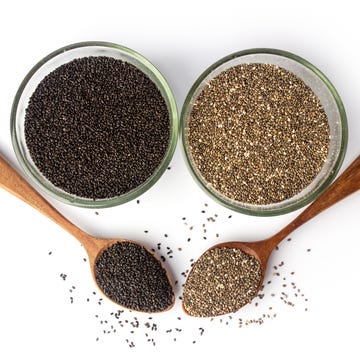Water may be the cornerstone of my hydration routine, but kefir has also earned an important place in my daily lineup. I didn't expect to fall in love with a fermented milk drink, but here we are.
I picked up my first bottle of kefir years ago after a clinical dietitian friend told me about it. I had never even heard of kefir, but it was a dietary staple in Belarus, where she grew up. She spoke about kefir's impressive health benefits and versatility, so I decided to give it a try.
At the time, there were only one or two kefir brands tucked away on grocery store shelves here in the U.S. Since then, the variety, flavors and popularity have exploded. These days, kefir is a daily part of my routine, and my whole family drinks it now too. It's earned a permanent spot in our fridge and on our grocery list. Below, I'll break down what makes kefir so great, plus tips on how to enjoy it even if you're unsure about its signature tang.
What is Kefir?
Think of kefir as a kind of drinkable yogurt. This fermented beverage is made by mixing milk with yeast and kefir grains, which aren't actual grains like rice or wheat but rather living colonies of bacteria. These "grains" ferment the milk, transforming it into a tangy, slightly fizzy, gluten-free drink.
Kefir can be made from a variety of milks, including cow, goat and sheep milk, as well as even just water in the case of water kefir. The purest form is plain and unsweetened, but many brands now offer flavored and sweetened varieties that help temper its signature tang. You can make it at home, but between getting the fermentation just right and keeping the process safe and sanitary, it's quite the commitment, which is why I haven't tried it myself.
Kefir Nutrition Information
Serving Size: 1 cup of plain, low-fat Lifeway kefir (240 mL)
- 110 calories
- 2 g total fat
- 10 mg cholesterol
- 125 mg sodium
- 9 g total carbohydrate
- 0 g fiber
- 9 g total sugars
- 0 g added sugar
- 10 g protein
- 3.8 mcg vitamin D (20% DV)
- 390 mg calcium (30% DV)
- 380 mg potassium (8% DV)
Health Benefits of Kefir
A true nutritional powerhouse, kefir is packed with a slew of beneficial vitamins and minerals. It's naturally rich in calcium and protein, as well as several other nutrients including vitamin A, vitamin B12, potassium and even selenium. Some of kefir's most promising health benefits include that it:
How I Use Kefir in My Daily Life
I typically drink kefir plain since I'm used to the taste, and tend to have it at the same time every day. But here are a few unique ways to try:
- Smoothies: Use kefir instead of yogurt or milk in any smoothie. It adds creaminess and a protein punch, and pairs well with berries, bananas and mango.
- Protein Shakes: Kefir also works great blended with protein powder, since it's thicker and creamier than milk or water. It also adds a gut-friendly spin to your standard post-workout drink.
- Overnight Oats: Swap out milk for kefir in your favorite overnight oats recipe for an even creamier and tangier breakfast treat. It works for chia pudding recipes, too.
- Kefir Bowls: I like to layer kefir with granola, fresh fruit, shredded coconut, nuts, seeds and a drizzle of honey for a nourishing snack. For this, I tend to reach for a full-fat kefir that's a bit thicker in consistency. You can also blend it with cottage cheese and frozen banana as a smoothie bowl base.
- Salad Dressings: Use kefir instead of yogurt as the base in creamy homemade salad dressings. Keep in mind that it has a thinner consistency, so you may want to adjust the amount of other liquids such as vinegar or lemon juice.
- Baked Goods: You could use kefir to substitute milk in everything from pancakes to quick breads, which I have found makes it even fluffier. Kefir can also be used in marinades for meat, as the acidity can help tenderize the proteins. However, just take note that while it will still add a dose of protein and beneficial vitamins, baking or cooking kefir will kill most of the live probiotics.
Which Kefir Should I Buy?
Whenever possible, opt for plain kefir, as many flavored varieties contain excess added sugar. If you're choosing a flavored option, look for ones that use real, whole fruit for flavor like Maple Hill's strawberry kefir, and aim to keep the added sugar content per glass under 8 grams (the equivalent of two teaspoons).
Check the label to make sure the kefir contains live and active probiotic cultures. When it comes to dairy kefir, you'll typically see low-fat and full-fat varieties. The choice really comes down to personal preference and how you plan to use it. For recipes where texture matters like in creamy salad dressings, whole milk kefir is often ideal thanks to its thicker consistency. Low-fat versions, by contrast, tend to be thinner and more watery, which blends well into smoothies.
Here are some kefir choices approved by the Good Housekeeping Institute Nutrition Lab to help you get started.
Is Kefir Right for Everyone?
Plain kefir can be a fantastic addition to most people's diets, thanks to its rich probiotic content, high-quality protein and slew of beneficial nutrients like calcium and B vitamins. Even children and women who are pregnant or nursing can benefit from the beverage. But people with dairy allergies should avoid it, as well as those on a low-histamine diet. If you have a compromised immune system, I'd recommend avoiding unpasteurized or homemade versions.
The Bottom Line
Kefir is a practical and nutritious addition to my diet that I've stayed consistent with for years. It's not only easy to grab, but also loaded with beneficial nutrients like calcium, protein and B vitamins, all in a single glass. Whether you drink it straight or transform it into a delicious smoothie bowl, there are many ways to enjoy this tangy and creamy beverage. Drinking kefir daily is a simple habit that helps me feel my best, and that's reason enough to keep it in my routine.
Laura Iu, R.D., is a registered dietitian nutritionist, certified intuitive eating counselor, yoga guide, and owner of Laura Iu Nutrition, a private practice in New York City. She earned her Bachelor of Science in Nutrition and Dietetics from New York University and completed her internship in dietetics at Weill Cornell & Columbia Medical Center of New York-Presbyterian Hospital. She went on to work in New York City’s top hospitals, including Mount Sinai Hospital and NYU Langone Health. She believes that true health is all encompassing — physical, emotional, and mental wellbeing — not an external measure via shape or size.


















